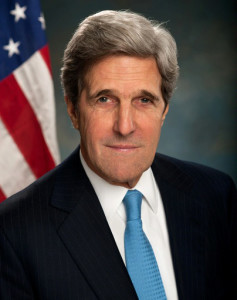News
Israel considers alternatives to the march toward a single, non-Jewish state

United States Secretary of the State John Kerry, uproars Israel on Sunday after warning that the country, through its continued West Bank occupation, will become a “binational state” (Wikipedia photo)
JERUSALEM – U.S. Secretary of State John Kerry set off an uproar in Israel on Sunday after warning that the country, through its continued West Bank occupation, will become a “binational state.”
Kerry’s words describe a scenario that would mark a failure of U.S. policy and end to Israel’s existence as a country that is both Jewish and democratic. The U.S., the international community and many Israelis have endorsed the “two-state solution” establishing a Palestinian state and ending Israel’s control over millions of Palestinians in territories occupied in the 1967 war.
Prime Minister Benjamin Netanyahu declared Sunday that “Israel will not be a binational state” and blamed the Palestinians for the failure of peace efforts. But despite Netanyahu’s pledges, Jewish settlement of the West Bank continues apace, while confusion over his true intentions grows by the day.
Meanwhile, Israel seems unable to stem a wave of stabbings and other attacks by Palestinian individuals, now in its third month, that has killed 19 Israelis and left over 100 Palestinians, most said by Israel to be attackers, dead.
This situation has sharpened the country’s half-century-old debate over the Palestinians. Opposition politicians, intellectuals and retired military commanders are issuing increasingly strident warnings that never-ending violence awaits if Israel continues to occupy millions of angry Palestinians who cannot vote in its national elections.
“If Israel were the Titanic and the binational apartheid state its iceberg…then the collision with the iceberg has already occurred,” wrote columnist Rogel Alpher in the Haaretz daily. “Without a diplomatic solution, we will continue to slowly sink into an existence of knifings, hatred and fear.”
Here’s a look at the potential “one-state” outcome:
THE ARGUMENT FOR PULLING OUT OF THE WEST BANK
Ever since Israel seized the West Bank and Gaza from Jordan and Egypt in 1967, the question of the territories’ fate has hung in the air.
Israel’s more dovish left wing has favoured a pullout from most of the areas, hoping this will bring Israel recognition and peace in the region. But over two decades of failed peace talks have convinced many a deal is not possible.
The left still favours a pullout, but the rationale has shifted to something more like nationalism: without a pullout, Israel would no longer be a Jewish-majority democracy because half of its population in effect will be Palestinians, most of them without true democratic rights.
That’s because while Israel proper the area defined by 1949 cease-fire lines that ended the war surrounding Israel’s establishment has roughly 6.3 million Jews and 1.7 million Palestinian citizens of Israel. Adding the West Bank and Gaza, demographers believe, would make the Arab and Jewish populations essentially equal.
A pullout from the West Bank is complicated by the presence of Jewish settlers, numbering 400,000 and growing. Eventually the situation may become irreversible, with the Palestinians abandoning efforts to set up their own state and instead demanding annexation and voting rights as citizens of a single “binational” state. Israelis who fear this scenario and see a future of internecine conflict, global economic boycotts and increasing isolation want a pullout now, from at least most of the West Bank, even without an agreement with the Palestinians.
“If the Israelis don’t hurry up to implement the two-state solution on the ground, they will lose,” said Ahmed Qurei, a longtime Palestinian negotiator.
THE ARGUMENT FOR NOT PULLING OUT OF THE WEST BANK
For some Jewish Israelis, the West Bank is literally the Promised Land _ full of biblical places like Hebron, Jericho, Bethlehem and Shilo that must be kept as a birthright, whatever the consequences.
But this is a minority opinion, even among proponents of the occupation. The more common argument is rooted in security.
Without the West Bank, Israel would be about 10 miles (about 15 kilometres) wide at its narrowest point, with the West Bank looming over population centres and surrounding Jerusalem on three sides. Meanwhile, Islamic radicals are on the march across the region. Such Israelis imagine a future in which some version of the Islamic State group seizes control of the West Bank and launches daily attacks at Israel. They conclude that prudence requires holding onto the West Bank; the Palestinians must be satisfied with their autonomy zones set up under interim agreements in the 1990s.
THE IMPACT OF GAZA
Israel pulled troops and settlers out of the Gaza Strip in 2005 as part of a simple calculation: With the small but crowded territory neatly removed from the demographic equation, Jews still have a majority of some 60 percent. But the Islamic militants of Hamas seized control of Gaza, periodically firing rockets at Israel and leading the sides to three mini-wars to date. Many Israelis fear the West Bank will face a similar fate if Israeli withdraws. Meanwhile, the Palestinians and much of the world consider Gaza to still be occupied, since Israel blockades it and controls the airspace and sea access in an effort to minimize Hamas’ ability to arm itself.
KEEP THE ARMY, REMOVE THE SETTLERS?
A paper published two weeks ago by a major Israeli think-tank proposed a new unilateral solution in which settlers would be pulled out of most of the West Bank to create a situation more amenable to partition. The army would maintain its current positions until a better alternative emerged. The authors economist Avner Halevi and Gilead Sher, a former chief negotiator with the Palestinians said this would require removing about 100,000 settlers, while others living close to Israel’s de facto border would remain pending a future negotiation. “The purpose of such a withdrawal would be to implement a temporary border that would create a reality of two nation-states,” Sher and Halevi wrote.





















